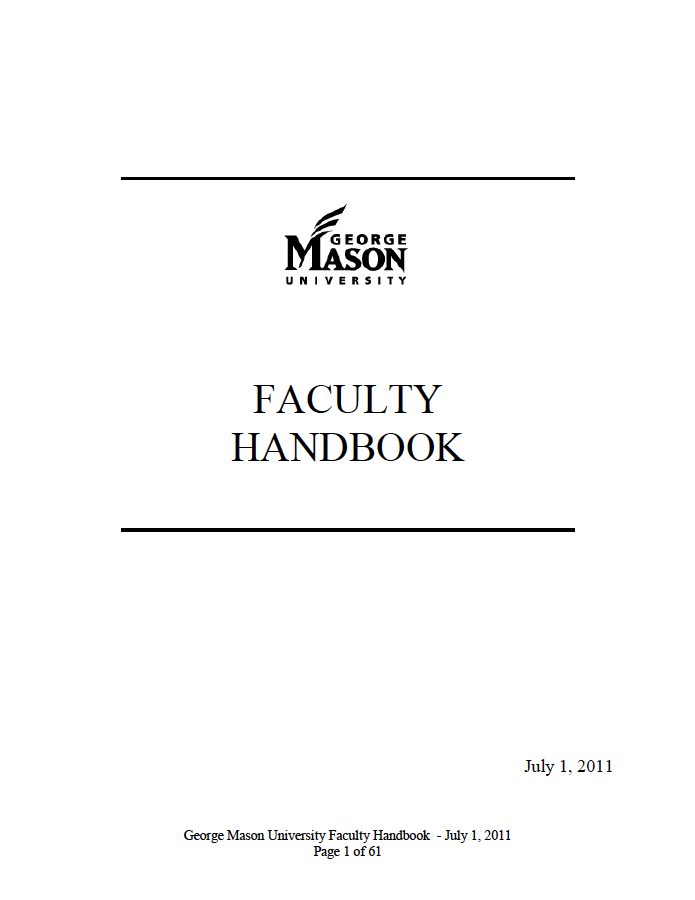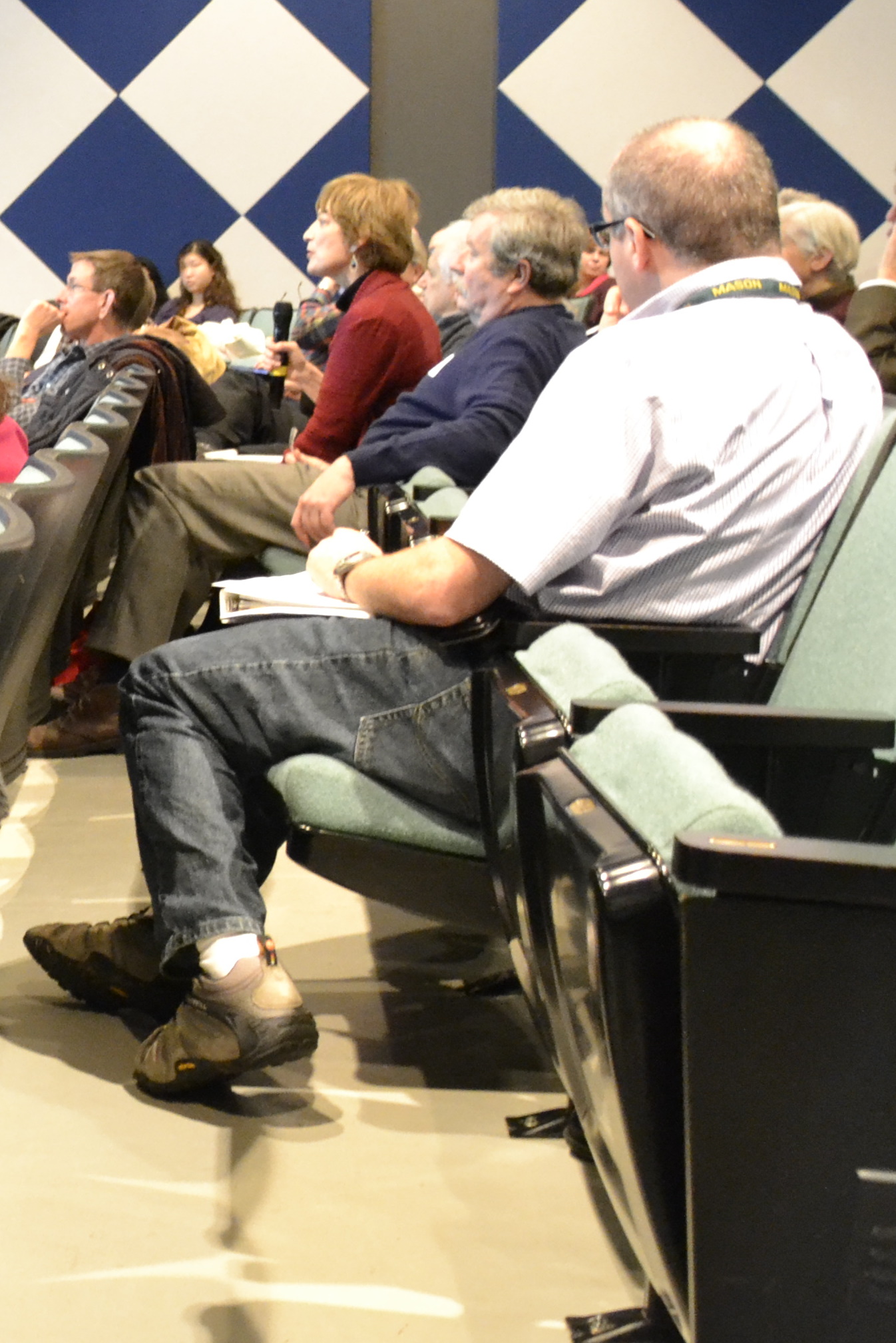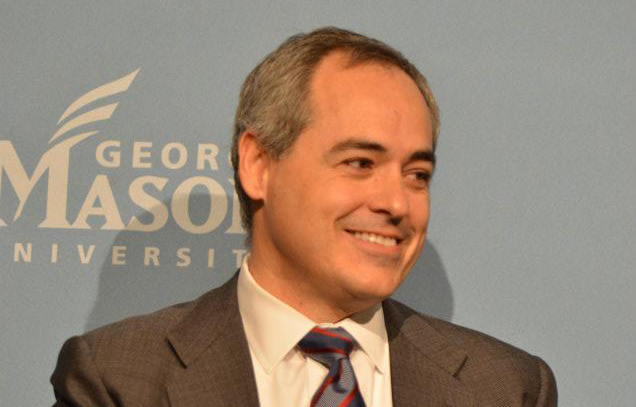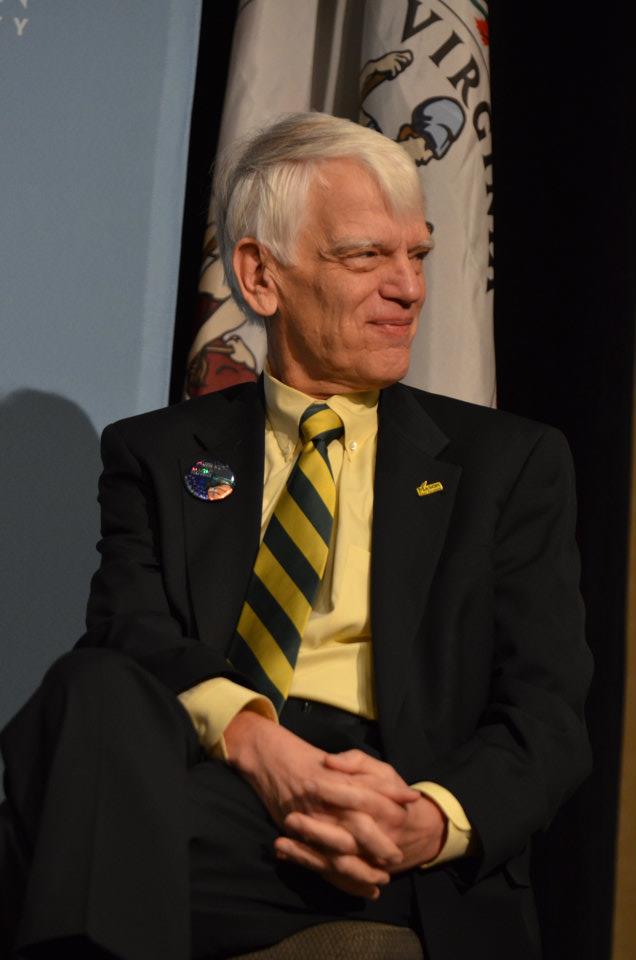BOV rector calls search confidentiality practice ‘infraction,’ not ‘violation’
Board of Visitors Rector Ernst Volgenau said in front of the Faculty Senate Wednesday that the BOV did not “technically follow the rule of the Faculty Handbook” in the recent presidential search process, and stood by the BOV’s right to change some of the document’s policy.
“As Rector, I apologize for not following the spirit of the Faculty Handbook,” said Volgenau during the regular Faculty Senate meeting. “I don’t think we are compelled to follow it. There are parts of the Faculty Handbook that are also parts of contracts and those parts can’t be changed.”
Volgenau’s statements come amidst an ongoing debate between Faculty Senate, administrators and the BOV concerning confidentiality in the presidential search process.
 Whether the 61-page document is all-contractual or "aspirational" is at the center of discussion between the Faculty Senate, administrators and BOV.
Whether the 61-page document is all-contractual or "aspirational" is at the center of discussion between the Faculty Senate, administrators and BOV.
Since the BOV’s appointment in December 2011 of Ángel Cabrera as incoming president, Faculty Senate members have held special meetings and made requests for clarification about the closed process and exclusion of general faculty input on the final candidates as outlined in the Faculty Handbook. Because of language in the Handbook’s preamble that states its provisions are “binding on on the University and on individual faculty members,” a debate on whether the document is all-contractual or partially “aspirational” has risen from actions last fall.
The Faculty Handbook, last updated by the Faculty Senate and approved by the BOV on May 4, 2011, says that the search and selection process “must include opportunities for the General Faculty to meet with candidates who are finalists for the presidency.”
Volgenau told the Faculty Senate that during a BOV session on Dec. 9, which members of the search committee were invited to attend, the Board reached consensus on a single candidate. Members of the Faculty Senate were invited late that night to attend a meeting with the final candidate, Cabrera, Sunday morning, Dec. 10.
“I contend that it was an ‘infraction,’ not a ‘violation,’ because we gave the Faculty the opportunity to interview one candidate,” Volgenau said.
According to Volgenau, since the BOV approves the Faculty Handbook, the BOV has the right to modify its provisions.
“[The Faculty Handbook] is a policy put in place by the Board of Visitors and the Board of Visitors has a right to change policy,” said Volgenau at the meeting. “The Board, in its wisdom, decided to change the policy on Dec. 9.”
Cabrera was voted in as incoming president at a special BOV session on Dec. 15.
Volgenau, whose term as rector ends at the end of this semester, spent forty minutes answering questions from the Faculty Senate. Questions ranged from to “How would you feel?” to “Does the Board care?” to “Why have a handbook?”
 Faculty Senate member Susan Trencher poses a question on trust at the Feb. 8 meeting. (Kevin Loker)
Faculty Senate member Susan Trencher poses a question on trust at the Feb. 8 meeting. (Kevin Loker)
University Counsel Thomas M. Moncure Jr. was also present at the meeting. At a special meeting held by the Faculty Senate on Feb. 8 – which was opened to the general faculty and moved to the Johnson Center Cinema because of faculty interest in attendance – Moncure responded to a question about the contractual role of faculty handbooks as tested in the court system. He quoted court reasoning in Faculty for Responsible Change v. the Visitors of James Madison University, a case in which JMU’s Visitors won disputes over faculty employment matters and one he said demonstrated that faculty handbooks are not contractual.
“‘The crew may be displeased with the captain but that displeasure does not give rise to a right of action cognizable in the Commonwealth,’” Moncure read from the decision during the meeting.
“. . . Part of the [Faculty Handbook] is aspirational,” he said.
The issue of faculty handbooks as contractual agreements has been brought to other courts, both inside and outside Virginia, with different outcomes. Five additional cases were included in attachments to the special meeting’s agenda.
In early 1992, 78 members of the Indiana State University faculty sought a declaratory judgement and permanent injunction against that university’s Board for conducting a search and appointing a president in violation of their faculty handbook. As part of the legal action in Tabbox v. Indiana State University Board of Trustees, the court was asked to address the legal status of the handbook as a “contract between Faculty and the University.” The parties settled, and the agreement did not directly address whether the handbook is an enforceable contract.
At least one court has decided that a faculty handbook can be legally binding. In University of Dubuque v. University of Dubuque Faculty Assembly, the Board sued 46 faculty members at the institution, seeking to establish that their faculty handbook was not a contractual agreement, but simply a “formal institutional policy statement.” The trustees argued in court that the document was a “guidepost,” because if not, the Board would be “stymied by the faculty senate.”
Though the Board claimed victory in the case because of conflicting clauses about modification procedures, the court did conclude that their faculty handbook was “legally binding and enforceable upon both parties.”
Because there are differences in the language of the Mason and JMU faculty handbooks, some members of the faculty senate are considering secondary opinions, including legal advice, about the handbook’s contractual status.
“Some have looked at the document and said they can see grounds that this could be pursued [in court],” said Susan Trencher, Faculty Senate member and anthropology and sociology department chair.
David Kuebrich, an associate English professor and fellow Faculty Senate member, has received from the American Association of University Professors the names of five Virginia lawyers who “have experience in faculty employment matters.” A member of Mason’s AAUP chapter, Kuebrich has also put in a request with AAUP’s national office to provide a list of schools that have recently conducted open presidential searches, “at least to the extent that, as part of the decision-making process, one or more candidates were brought to meet with general faculty and other interested constituencies.”
“It could be that it’s exactly what we’ve been told, or it could be that it’s a more complicated issue,” said Kuebrich to Rector Volgenau in the Feb. 28 meeting. “I just want to keep complications in mind.”
In addition to possibly seeking legal opinion on the issue of the handbook as a contractual agreement, members of the Faculty Senate have expressed further concern about general issues of reconciling trust and the Board’s ability for what some Faculty Senate members have called “unilateral” decision-making.
“If the BOV violated the handbook at this level, how are we to trust it at any level?” said Trencher.
At the meeting, Trencher posed another question to the Rector directly.
“Why have a handbook?” Trencher said.
Volgenau responded saying that just because it is not a contract doesn’t mean it can’t add value to the institution.
“As I reflect on it, I think that the [BOV] has by far honored the Faculty Handbook, much more than it’s violated it,” said Volgenau. “It’s good policy, it was designed by the faculty with a lot of reflection and the Board, when it’s doing its job properly, reflects on it as well. But it’s not a contract.”
Retelling a story of how when he was young, Volgenau described how he once wanted a horse but wasn’t able to get it.
“Because my father didn’t give me that horse. . . I thought my father didn’t love me,” said Volgenau. “And he did love me.”
He applied the idea to the current debate.
“The Board of Visitors are not your parents,” said Volgenau. “But just because they don’t do everything you want them to, [it] doesn’t mean they don’t care for you.”
At the end of Volgenau’s time in front of the Faculty Senate, members applauded the work he had done during his time as rector, particularly his involvement with helping to add faculty representation to the Board. A new rector has not yet been appointed.
“I have to say something. Three words. ‘We love you,’” said Volgenau.
Do confidential searches return “better” candidates?

Ángel Cabrera, sitting president of Thunderbird School of Global Management, sits onstage at a press conference following the BOV vote to appoint him. (Dakota Cunningham)
A total of over 150 nominations (including one from an elementary school teacher) were made in the search process that resulted in Cabrera’s selection, according to June Tangney, professor of psychology and a Faculty Senate member who served as one of four faculty representatives on the search committee. After review, 16 semi-finalists were identified and interviewed. Four finalists were identified by the search committee and 2 were recommended by the BOV.
Once six finalists were identified, “things moved very, very quickly,” according to Tangney. Competing offers were on the table. Finalists were re-interviewed, search committee members had dinner with candidates and their spouses, and the selection committee voted and was solicited for additional comments and advice. Invitations then went out to senators for the Dec. 10 breakfast meeting with the one finalist, Cabrera.
The opportunity for the General Faculty to meet with candidates who were finalists, outlined in the Faculty Handbook, did not occur. A number involved in the search were aware of faculty’s concerns.
“We were informed well in advance by [Chair of the Faculty Senate Peter Pober],” said Volgenau at the Feb. 28 meeting. “He sent me a letter saying ‘Be sure to remember that the Faculty Handbook says this.”
Pober spoke on the role of the faculty representatives on the search committee during the Feb. 8 special meeting.
“We did indeed make sure that they understood, at every single step of the process, that we wanted more faculty input and we were concerned about the prospect of not having an open meeting with candidates during latter stages,” Pober told general faculty at the special meeting. “While we were told that the confidentiality must remain until the very end – because the six finalists were indeed asked and they all insisted that it remain until the very end – we kept the concerns of the faculty alive during the duration of it.”
While it is unknown whether any of the final six candidates stated why they wished to maintain confidentiality during the search, many institutions have embraced a confidential search process in order to protect candidates’ incumbent positions.
Jan Greenwood and Betty Turner Asher of Greenwood Asher and Associates, the search firm hired to conduct Mason’s recent presidential search, published a 2011 article in the Chronicle of Higher Education which discusses the negative consequences faced by presidents who pursue other job opportunities.
“[Candidates] were at risk of being fired, and if they were not offered a job, or turned an offer down, they often found their leadership weakened at their home university,” said Greenwood and Asher in the article.
Greenwood and Asher’s claims, which have appeared in public conversation among Faculty Senate members and administrators, conflict with the results of a 2005 study conducted by the AAUP which examines the impact of sunshine laws on higher education governance. Sunshine laws refer to freedom of information legislation and states often have their own sunshine laws specifically applied to higher education.
“Although we share the concerns about the potential negative effects of sunshine laws on presidential candidate pools, we find no compelling evidence of diminished presidential quality as a result of openness requirements,” says the AAUP study.
Language taken from the AAUP’s policy statements was used to construct Mason’s Faculty Handbook. The handbook also notes that the inclusion of AAUP language does not represent an endorsement of the organization by the university.
High-ranking administrators at Mason have been involved in open searches for university presidencies, at least one as recent as last fall. In November and December, University Senior Vice President Maurice Scherrens was one of three finalists being considered for a university presidency at Pennsylvania’s Edinboro University.
 Outgoing President Alan Merten sits onstage at the December 2011 press conference on Cabrera's appointment. (Dakota Cunningham)
Outgoing President Alan Merten sits onstage at the December 2011 press conference on Cabrera's appointment. (Dakota Cunningham)
Twelve years ago, President Alan Merten was also involved in an open presidential search. Merten was one of six final candidates for the vacated presidency at the University of Florida, the institution at which he previously served as Dean of the College of Business Administration. He chose to withdraw his name for consideration shortly before his scheduled interview for the presidency.
The search Merten was involved with in 2000 was a failed search. Chuck Young, the interim president, carried on in the capacity of president until 2004, when current president Bernie Machen was appointed.
Trencher, one of the Faculty Senate members who called for the Feb. 8 special meeting, cited President Merten’s involvement in the open search process for president of the University of Florida as evidence that involvement in open searches doesn’t frequently endanger a candidate’s current position with a university.
“[Merten] applied [at University of Florida]. . .No one fired him,” Trencher said. Merten, who has been president at Mason since 1997, will step down at the end of June.
All presidential search processes at Florida public universities are open under state sunshine laws.
“This claim that [presidential candidates] endanger their own position, at least to some of us, seems highly exaggerated,” said Trencher.
Faculty Senate members are invited to a March 7 informal meet-and-greet with incoming president Cabrera, who is finishing up his time as president at Thunderbird School of Global Management, a private graduate business school in Arizona.
“There was a request that [Cabrera] at least speak [to the concerns of confidentiality],” said Pober, who put in the request on behalf of the Faculty Senate Executive Committee. “I have been told the Provost would tell him that we hoped he would speak about [the concerns].”

